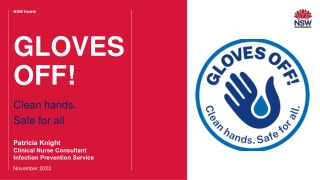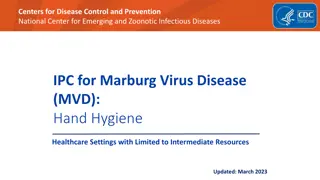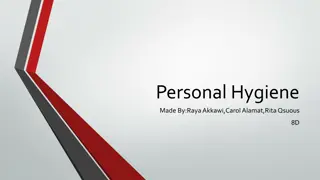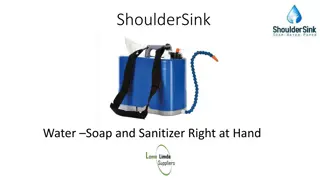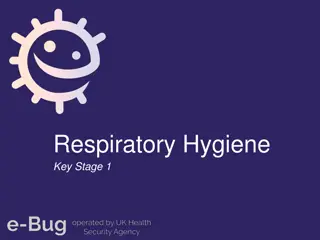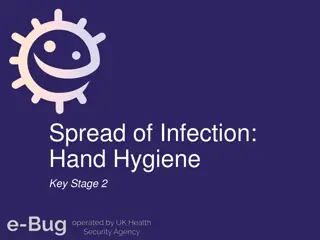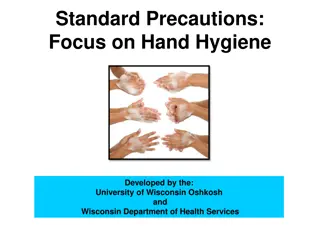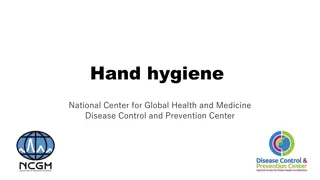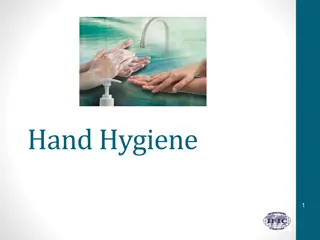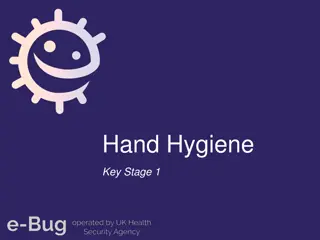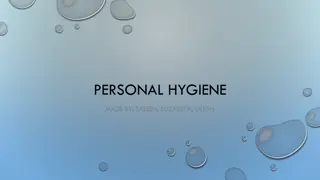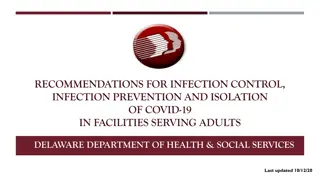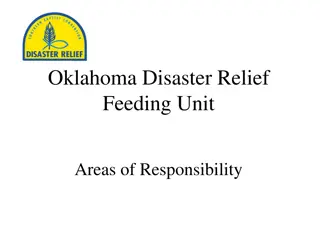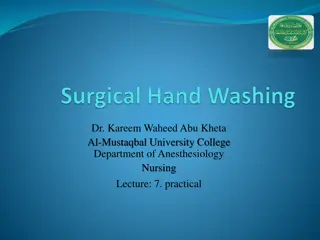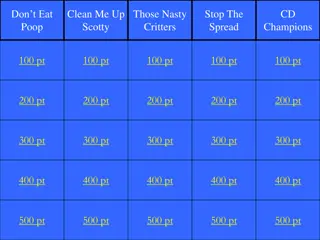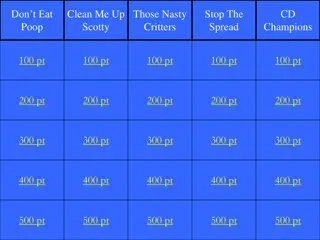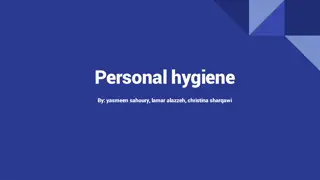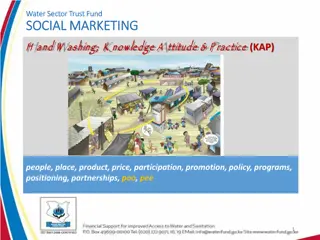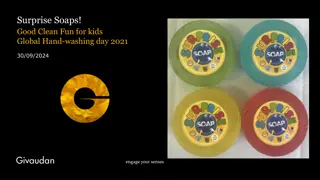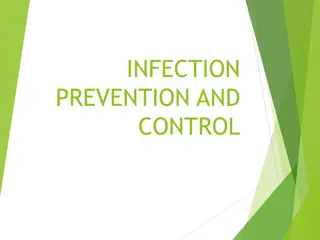Importance of Hand Washing and Respiratory Hygiene in Infection Prevention
Understanding the importance of hand washing and covering coughs/sneezes in preventing the spread of infection is crucial. Through activities like the Toilet Paper Experiment, students can learn about microbial transmission and the significance of personal hygiene practices. Discussions around personal hygiene procedures, the importance of hand washing before meals and after using the restroom, and methods to prevent the spread of infectious diseases are key learning points. This interactive approach aims to enhance students' knowledge and awareness of infection prevention and control strategies.
Download Presentation

Please find below an Image/Link to download the presentation.
The content on the website is provided AS IS for your information and personal use only. It may not be sold, licensed, or shared on other websites without obtaining consent from the author.If you encounter any issues during the download, it is possible that the publisher has removed the file from their server.
You are allowed to download the files provided on this website for personal or commercial use, subject to the condition that they are used lawfully. All files are the property of their respective owners.
The content on the website is provided AS IS for your information and personal use only. It may not be sold, licensed, or shared on other websites without obtaining consent from the author.
E N D
Presentation Transcript
Infection Prevention and Control (IPC): Hand and Respiratory Hygiene Key Stage 4
Learning Outcomes All students will: Understand that infection can be spread through unclean hands. Understand that hand washing can prevent the spread of infection. Understand how pathogens can be transmitted. Understand that covering your mouth and nose with a tissue or your sleeve (not your hands) when you cough, or sneeze helps prevent the spread of infection. e-Bug.eu
Curriculum Links English Reading Writing Art & Design Graphic communication PHSE/RHSE Health and prevention Science Working scientifically Scientific attitudes Experimental skills and investigations Analysis and evaluation Biology Cells Health and disease Development of medicines e-Bug.eu
Why is it Important to Wash Hands and Cover Our Sneezes/Coughs with Tissue? There are different ways in which microbes can be transmitted to people. Examples include through the food we eat, the water we drink and bathe in, the things we touch and from sneezing. We wash our hands to wash away any microbes that might be on our hands; and if we didn t wash away the microbes we might get ill. We use our hands all the time, and we pick up millions of microbes every day. Although many of these are harmless some could be harmful. We spread our microbes to our friends and others through touch, and therefore we wash our hands to help prevent the spread of microbes. e-Bug.eu
Main Activity: Toilet Paper Experiment e-Bug.eu
5. Repeat step 4 then wash the swab and wipe it on plate C 3. Swab the plate of Saccharomyces cerevisiae then wipe it on plate A 1. Label 3 sterile malt agar plates A to C with your name and date 4. Cover a new swab with a layer of toilet paper then swab the plate of Saccharomyces cerevisiae and wipe it on plate B 6. Turn the plates upside down 2. Wash your hands and dry thoroughly e-Bug.eu
Discussion e-Bug.eu
Discussion Points Does the appearance of your dishes match your predictions? Are the class results consistent? What do the results suggest about personal hygiene procedures? Why is it important to wash your hands (a) before meals, (b) after using the lavatory? Suggest as many methods as you can to prevent the spread of infectious disease. e-Bug.eu
Extension Activities e-Bug.eu
Source of infection Someone or something carrying the harmful microbes that causes the infection. There are many different sources of infection, these can include: People already infected Pets or animals Contaminated food The Chain of Infection People at risk from infection We are all at risk from infection, but some are at greater risk: People on medication e.g chemotherapy The very young/elderly People with underlying diseases e.g HIV/AIDS, diabetes Way out for microbes Harmful microbes need a way to get out of an infected person or source before they can spread to someone else. Routes include: Sneezing, coughing, saliva Bodily fluid Juices from raw meat and poultry Way in for microbes Harmful microbes need a way to enter the body before they can cause an infection. This can be through: The food we eat Inhalation of aerosols or droplets Open cuts or sores Things we put in our mouths Spread of infection Harmful microbes need a way to be passed from a source to a person. This can be through: Direct touch/contact Sexual transmission Harmful microbes are also spread via: Hands, hand contact surfaces (e.g. door handles, keyboards, toilets) Food contact surfaces Air e-Bug.eu
Breaking the Chain of Infection Source of infection Isolate infected people Take care with raw food Wash pets regularly Treat pets for pathogens when needed Dispose of nappies and soiled clothing appropriately People at risk from infection Everyone: Take appropriate vaccinations High risk people: Keep away from people who are infectious Take extra care about cleanliness Take extra care when cooking and preparing food Way out for microbes Prevent any: Coughs and sneezes Faeces Vomit Bodily fluid Getting onto surfaces or hands Way in for microbes Cover cuts and open sores with a water proof dressing Cook food properly Take care to drink only clean water Spread of infection Wash hands thoroughly and regularly Cover cuts and open sores Take appropriate precautions during sexual activity e-Bug.eu
Wash your hands with soap and water for 20 seconds Hand Washing Poster 1 2 3 Back of hands Palm to palm Between fingers 6 4 5 Tip of fingers Back of fingers Thumbs To help keep time, sing Happy Birthday twice e-Bug.eu
Stomach Bug Chain of Infection This activity can be carried out in groups of 2 4 students or as a classroom discussion. Imagine the spread of gastroenteritis (a stomach bug) in your school from a single infected student. Take into account the situations of everyday life in school (going to the toilets without washing hands or washing them without soap, going to eat at the school canteen, borrowing pens or other things from friends, holding hands, hugging friends, using a computer ). Report on ways in which the infection could spread and how quickly it could spread in their class or in the school. Consider the different ways you could stop the spread of infection. Think about and discuss the difficulties you encounter with respect to hand hygiene in school and to suggest how to use the existing hygiene facilities better. e-Bug.eu
Spread of Infection on a Cruise Scenario This activity can be carried out as a group or individual. You are going to predict how many people can become infected and how far influenza can travel in a week by an infected person. Imagine that you are on a Mediterranean cruise that will call at ports in Spain, France, Italy, Malta and Greece. At each port-of-call passengers can choose to get off for shore excursions or stay on the ship. On the cruise there are: a. b. c. Czech Republic and Germany. d. The remaining passengers plan to return home to the USA and China. A family who will be returning home to Australia after the cruise. Two passengers planning an onward journey from Greece to Turkey. Four passengers planning an interrailing excursion through Hungary, A passenger boarding the cruise has a new strain of the influenza virus and it is very contagious. a. this virus could travel in 24 hours, and in 1 week. b. What could have been done to prevent the infection travelling so far? Hypothesise and consider how many people he might infect and how far e-Bug.eu
Learning Consolidation e-Bug.eu
Hand Hygiene Quiz Why should we use soap to wash our hands? (2 points) How can you spread microbes to others? (2 points) It helps remove invisible microbes too small to be seen by our eyes It breaks up the oil on our hands which trap microbes It keeps our hands moist It doesn t matter if we use soap or not By touching them By looking at them By speaking to them on the phone By sneezing e-Bug.eu
Hand Hygiene Quiz Who might be at risk as a result of you not washing your hands properly? (1 point) Which is NOT one of the 6 steps of hand washing? (1 point) Palm to palm The thumbs Arms In between fingers You Your family Your friends All of the above e-Bug.eu
Hand Hygiene Quiz How can you stop harmful microbes from spreading? (2 points) When should we wash our hands? (3 points) Do nothing Wash hands in water Use hand sanitiser if soap and water are not available Wash your hands with running water and soap After stroking a pet After sneezing or coughing After watching TV After using the bathroom or changing a soiled nappy e-Bug.eu
Hand Hygiene Quiz After we sneeze into our tissue, we should: (2 points) How long should we wash our hands for? (1 point) Wash our hands immediately Dry our hands on our clothes Take antibiotics Put the tissue straight into the bin 10 seconds 20 seconds (length of Happy birthday song twice) 1 minute 5 minutes e-Bug.eu
Hand Hygiene Quiz - Answers Why should we use soap to wash our hands? (2 points) How can you spread microbes to others? (2 points) It helps remove invisible microbes too small to be seen by our eyes It breaks up the oil on our hands which trap microbes It keeps our hands moist It doesn t matter if we use soap or not By touching them By looking at them By speaking to them on the phone By sneezing e-Bug.eu
Hand Hygiene Quiz - Answers Who might be at risk as a result of you not washing your hands properly? (1 point) Which is NOT one of the 6 steps of hand washing? (1 point) Palm to palm The thumbs Arms In between fingers You Your family Your friends All of the above e-Bug.eu
Hand Hygiene Quiz - Answers How can you stop harmful microbes from spreading? (2 points) When should we wash our hands? (3 points) Do nothing Wash hands in water Use hand sanitiser if soap and water are not available Wash your hands with running water and soap After stroking a pet After sneezing or coughing After watching TV After using the bathroom or changing a soiled nappy e-Bug.eu
Hand Hygiene Quiz - Answers After we sneeze into our tissue, we should: (2 points) How long should we wash our hands for? (1 point) Wash our hands immediately Dry our hands on our clothes Take antibiotics Put the tissue straight into the bin 10 seconds 20 seconds (length of Happy birthday song twice) 1 minute 5 minutes e-Bug.eu
Respiratory Hygiene Quiz After we sneeze into our hands, we should: (1 point) How can you spread microbes to others? (3 points) Wash our hands Dry our hands on our clothes Take antibiotics None of the above is necessary Touching Sleeping Sneezing Coughing e-Bug.eu
Respiratory Hygiene Quiz If you do not have a tissue available, the next best option is to sneeze: (1 point) The best way to stop microbes from spreading is: (2 points) To use your hand to cover your sneeze To use a tissue to cover your sneeze To use a sleeve if you haven t got a tissue To drink plenty of fluids Into your hands Into your sleeve Into an empty space Onto your desk e-Bug.eu
Respiratory Hygiene Quiz What should you do with a tissue after sneezing into it? (1 point) What might happen if we don t wash our hands after sneezing into them? (1 point) Put it in your pocket for next time Put it straight in the bin Put it up your sleeve for next time Any of the above Nothing Transfer harmful microbes to other people Help protect our microbes e-Bug.eu
Respiratory Hygiene Quiz - Answers After we sneeze into our hands, we should: (1 point) How can you spread microbes to others? (3 points) Wash our hands Dry our hands on our clothes Take antibiotics None of the above is necessary Touching Sleeping Sneezing Coughing e-Bug.eu
Respiratory Hygiene Quiz - Answers If you do not have a tissue available, the next best option is to sneeze: (1 point) The best way to stop microbes from spreading is: (2 points) To use your hand to cover your sneeze To use a tissue to cover your sneeze To use a sleeve if you haven t got a tissue To drink plenty of fluids Into your hands Into your sleeve Into an empty space Onto your desk e-Bug.eu
Respiratory Hygiene Quiz - Answers What should you do with a tissue after sneezing into it? (1 point) What might happen if we don t wash our hands after sneezing into them? (1 point) Put it in your pocket for next time Put it straight in the bin Put it up your sleeve for next time Any of the above Nothing Transfer harmful microbes to other people Help protect our microbes e-Bug.eu


